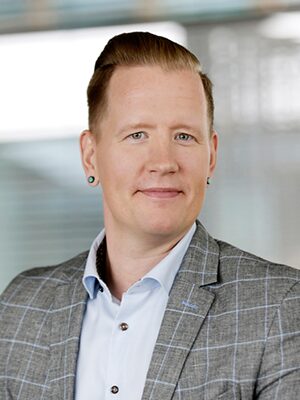Foreign experts enjoy living in Finland – Those planning to leave suffer from a lack of friends

GE HealthCare is a leading health technology innovator that strongly encourages young talent at its Finnish unit, which will employ ninety interns this year. The company treats summer employees as full members of the workplace community, and many return after graduation.
A recent study largely makes for comfortable reading: most experts who move to Finland to work are very happy living here. But not everything is going perfectly: filling the vacancies in Finnish workplaces will require change, both in terms of company practices and societal services.
On her first day of work, Sofía González did not understand the instructions for the equipment in the workplace. No wonder – they were in Finnish! Vaisala, a manufacturer of sensors, is an international working environment, but González, who came from the Canary Islands to work in the prototyping department, was the first employee who did not speak Finnish. Nevertheless, it was not an unreasonable problem.
“By the following morning, my colleague had written instructions for me in English,” González says.
Many workplaces face similar situations, where the language needs to be switched from Finnish to English, as Finland is internationalising at a rapid pace. The reason is a shortage of workers.
Today, around 20,000 people move to Finland for work every year, but this number is not enough to tackle the talent shortage. According to Eero Manninen, Senior Advisor at Technology Industries of Finland, Finland’s net migration should increase to approximately 50,000 people annually.
“Otherwise, it will be difficult for us to maintain our welfare society and business competitiveness,” Manninen says.
How Long Does It Take to Open a Bank Account?
Manninen says that the need for international workers has hit record highs. The shortfall will not correct itself – filling the vacancies in Finnish workplaces will require change, both in terms of company practices and societal services.
Manninen praises the current government for establishing the new class D visa for specialists. However, some of the other immigration bureaucracy remains rigid.
Manninen says that the processes should be more digitised to make immigration run more smoothly. For example, when a person’s residence permit process is initiated, they should also be digitally connected to the Tax Administration and a bank. In this way, when the residence permit is granted, the other processes would already be almost complete, and they would not need to be laboriously started separately as is the case today.
But even before a bank account is needed to receive salary payments, companies need to do more to market their vacancies.
“In India, for example, IT experts know all about Germany. But Finland may not be quite as well-known over there,” Eero Manninen says.
Safety Is a Genuine Advantage
Eero Manninen says that companies suffering labour shortages should analyse where they could find suitable employees and go there to market their positions and tell people about life in Finland. Another option is to turn to support services and networks and send a representative of a partner company on a recruitment trip.
One thing worth shouting about at recruitment events is that four out of five highly educated foreigners who move to Finland say that they have adapted well or very well to the country. This is one of the results of Foreign talents in Finland: working life, everyday life and inclusion, a publication by E2 Research. The research institute interviewed 753 foreign experts with university degrees.
“People with families appreciated the good early childhood education and free schooling in Finland,” says Manninen.
Many foreigners have been pleasantly surprised to discover that in Finland, nature begins just beyond the city centres. According to Manninen, Finland should continue to advertise this fact. The feeling of safety is another important factor for many people in Finland.
But not everyone likes living in Finland. It is, of course, natural that some international experts only stay for a short time. The survey revealed that the people who did not enjoy living in Finland and planned to leave had something in common: a lack of friends. They have not managed to strike up meaningful interpersonal relationships that provide a sense of belonging to the place and community.
Strategies for Recruiting International Experts:
- Use anonymous recruitment. Hiding the applicant’s age, gender, name, and the country where they gained their work experience can give candidates a fairer opportunity to highlight their expertise.
- Expand your networks. Advertise the position publicly. Hire foreigners who are already in Finland. Help your international employees for help when recruiting.
- Lower your language requirements. Could the job be done in English? If the company has previously worked in Finnish, switching languages may initially feel difficult. However, requiring Finnish language skills will limit the company’s operations and growth over time.
Managers May Feel Intimidated by Speaking English
Two groups of foreigners find it particularly hard to gain employment in Finland. It can be difficult for the spouses of experts who come to work in Finland to find employment that matches their education. Unemployment and a lack of contacts make it hard to settle in. If the situation persists for a long time, the whole family may leave Finland.
The other dissatisfied group are foreigners who complete university degrees in Finland and have difficulty finding employment in their fields. It can be tricky for them even to arrange an internship. Following a fruitless job search, they may either leave the country or have to settle for lower-paid work.
Jenni Pitkänen, Senior Advisor at Technology Industries of Finland, finds the situation unfortunate for all involved. Unconscious prejudice and resistance to change are often contributing factors. Pitkänen advises companies to experiment and hire foreigners – both those in Finland and abroad – even if the company has never had a foreign employee. Few jobs genuinely require the Finnish language. However, some change management may be necessary.
“Before new people arrive, it is important to ensure that everything is OK with the existing personnel, they interact well, and their jobs are clear,” Pitkänen says.
She encourages managers to organise a safe conversational atmosphere for personnel transitioning to an English work community, so they can overcome any fears and worries they may have.
“Employees and managers may feel worried about whether their English is up to scratch. The uncertainty usually begins to melt away once people start speaking the language.”
Boosting diversity in the workplace is a continuous, long-term journey. Step by step, it is important to identify discriminatory practices, unconscious prejudices, stereotypes and micro-aggression – unintended comments directed at minority groups.
Increasing the diversity of the work community is ultimately highly beneficial. Different people notice and discover different things.
“Innovation has been shown to grow by 30 per cent, and risks fall by 20 per cent,” says Jenni Pitkänen.
Increasing the diversity of the work community is ultimately highly beneficial. Different people notice and discover different things.
Tips for Foreigners: Start Conversations About the Sauna
Sofía González, 26, has now worked for Vaisala for three years. She originally moved from Spain to Finland because she was attracted by the good reputation of a Master’s degree programme from Aalto University. But it was not the only draw.
“I wanted to try living in a different place. In Spain, young people are not financially independent, but I knew it was possible in Finland.”
González now lives in a shared flat in central Helsinki. The mechanical engineer is satisfied with her career prospects at Vaisala. In her leisure time, she goes to the gym and visits the cafés of Kallio. At weekends, González goes tour skating and skiing. The highly social woman has found plenty of friends.
“When someone moves from abroad, I think it is up to them to take the initiative and learn the local habits. I started by asking people about the sauna. Everyone likes talking about that here,” González laughs.
Sofía González has one suggestion for boosting Finland’s image.
“You should advertise May Day, student culture and perhaps the bar scene in Kallio to foreign jobseekers. All of these were surprising to me and have brought me joy.”
Guidelines for Assisting International Experts to Settle In
- Offer support to employees relocating to Finland. Help the employee and their family with permit applications and practical matters, such as finding a place to live, getting a driver’s licence and opening a bank account. There also be a need to help the family integrate.
- Set up a mentoring programme for newcomers. A colleague could volunteer to act as a mentor and provide support, guide the new employee around the company, present the work duties and introduce them to others.
- Invite them to join hobby groups. Ensure that new foreign employees are not excluded from the circle of existing employees. Invite them to join informal groups, trips and evenings out.
- Get service. If your company has not yet drafted procedures or policies, you could outsource your welcoming service to an HR service provider or join forces with other companies in your area. You can also approach Business Finland, the Finnish Immigration Service (Migri) and the Social Insurance Institution (Kela) for support and guidance. In Helsinki, the Spouse Program helps find employment for workers’ spouses.
Text: Kaisa Viitanen
Photos: Liisa Takala
These tips are from Senior Advisors Jenni Pitkänen and Eero Manninen.

Pitkänen Jenni
Senior Advisor, Development of Working Life – Advisory Services, Working Life Development and Legislative Advocacy Technology Industries of Finland
